The laws around recreational and medical marijuana use are quickly changing across the nation, and cultural attitudes to drug use are shifting just as fast. However, this doesn’t make driving while high any less dangerous or negligent, not to mention illegal.
In this blog, we’ll outline how Oklahoma’s drugged driving laws affect cases involving marijuana claims and how you can protect yourself in the event of a car crash.
Understanding Oklahoma’s Medical Marijuana Laws
Medical marijuana has been legal in Oklahoma since July 2018. To legally use medical marijuana, individuals must apply for a license and get a physician’s approval. Unlike some states, Oklahoma’s laws do not include a list of specific conditions covered by its medical marijuana law.
Within six months of legalization, 24,000 patients obtained a license to use medical marijuana. As of July 1, 2019, more than 146,000 Oklahomans had a medical marijuana license.
However, medical marijuana users still must abide by Oklahoma’s traffic and drugged driving laws. Our state is one of twelve that impose a zero-tolerance policy for driving while under the influence of marijuana. In other words, it’s against the law to drive with any THC (the compound that makes you feel high), in your system.
Drugged Driving Laws Apply to Medical Marijuana Use
Some states have adopted “per se” laws that allow users to drive with a certain level of THC in their system, the same way it is legal to drive with a blood-alcohol concentration (BAC) that is below 0.08 percent. Other states will not convict a drugged driver unless there is clear evidence that they were under the influence of marijuana.
In Oklahoma, however, it is illegal to get behind the wheel with any amount of marijuana metabolites in your system. When an officer has probable cause to believe that a driver is operating under the influence, they can arrest the driver and order a blood, saliva, or urine test.
RELATED ARTICLE: Steps to Take After a Car Collision
Signs a Driver May Be Driving Under the Influence
While there’s conflicting research about how marijuana impairs your driving, the National Highway Transportation Safety Administration (NHTSA) notes that people under the influence of cannabis are more likely to be involved in a car crash. Some drivers demonstrate slowed reaction times and fatigue, while others are erratic and reckless.
Identifying a driver who is under the influence of marijuana can be challenging. THC can remain in the bloodstream long after your high wears off. Furthermore, there isn’t a reliable roadside test for marijuana and cannabis products; currently available tests only identify THC’s presence and cannot pinpoint when the driver consumed cannabis or whether it’s causing an impairment. The police instead must look for other, circumstantial evidence, such as smoke in the car and bloodshot eyes, during a marijuana-related stop.
For this reason, if you suspect a driver is under the influence of marijuana, you should call 911 to report your suspicions. Provide details to the 911 operator, such as a smoke-filled car during or immediately after a crash, since this information can help the authorities determine the exact causes of your accident.
What to Do if You Are Involved in a Crash with Someone Driving While High
If you’ve been hurt in an accident and you suspect the other driver was operating under the influence of medical marijuana, follow these steps to protect yourself.
- Call 911 and the authorities right away. If you’re too injured to make the call or you lost your phone in the crash, ask a witness to make the call on your behalf. When the authorities arrive, cooperate with them completely.
- If you believe marijuana was a factor in the crash, report your suspicions to the responding officers and 911 operator immediately.
- Get the other driver’s contact information if you can, as well as that of any witnesses or responding officers. Also, be sure to take note of the police report number for future reference.
- After a crash, it’s essential that you seek medical treatment as soon as possible. If you’re badly injured, don’t wait to go to the emergency room or urgent care. Even if you don’t think you’re hurt, or hurt badly, it’s still best to seek medical treatment. A doctor may be able to identify a latent injury or condition that would otherwise be slow to develop and dangerous over time — such as an internal wound or concussion.
Finally, you should contact an Oklahoma personal injury lawyer. Proving a drugged driving claim can be difficult, especially when it involves a complicated substance like marijuana. Your lawyer can help you build your case, and may even consult with expert witnesses like toxicologists and substance abuse specialists, to link your crash to drug use.
AMA Law: Getting Justice for Victims of Drugged Driving
At AMA Law we believe no one should experience needless suffering. If you’ve been hurt by someone driving while high, you could be entitled to compensation, and we encourage you to contact us for a free case evaluation.
Please contact us today by calling (405) 757-2151 or completing this brief online form to schedule your appointment today.
References
Barnard, M. (2018, December 30). Medical marijuana has been legal in Oklahoma since July 26. What’s happened since then?
Tulsa World. Retrieved from https://www.tulsaworld.com/news/local/marijuana/gallery-medical-marijuana-has-been-legal-in-oklahoma-since-july/collection_09bc8a93-6031-51fd-9fb5-e21e3d528dc9.html#1
Butcher, K. (2019, July 2). More than 140K medical marijuana licenses approved in Oklahoma, officials say. KFOR. Retrieved from https://kfor.com/2019/07/02/more-than-140k-medical-marijuana-licenses-approved-in-oklahoma-officials-say/
Drugged driving | Marijuana-impaired driving (2019, March 3). National Conference of State Legislatures. Retrieved from https://www.ncsl.org/research/transportation/drugged-driving-overview.aspx
Drug-impaired driving (n.d.). NHTSA. Retrieved from https://www.nhtsa.gov/risky-driving/drug-impaired-driving
Schwartzapafel, B. (2017, January 17). How Cops Decide if You’re Too Stoned to Drive. Vice. Retrieved from https://www.vice.com/en_us/article/3ddz3j/how-cops-decide-if-youre-too-stoned-to-drive
The content provided here is for informational purposes only and should not be construed as legal advice on any subject.
